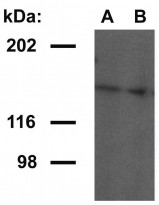ARG63117
anti-Ubinuclein 1 antibody [UBN1-02]
anti-Ubinuclein 1 antibody [UBN1-02] for Immunoprecipitation,Western blot and Human
Gene Regulation antibody; Microbiology and Infectious Disease antibody
Overview
| Product Description | Mouse Monoclonal antibody [UBN1-02] recognizes Ubinuclein 1 |
|---|---|
| Tested Reactivity | Hu |
| Tested Application | IP, WB |
| Specificity | The clone UBN1-02 recognizes N-terminal part of ubinuclein 1 (UBN1), a widely expressed nuclear and adhesion complex protein. Western blotting analysis reveals UBN1 as a 165 kDa band. |
| Host | Mouse |
| Clonality | Monoclonal |
| Clone | UBN1-02 |
| Isotype | IgG |
| Target Name | Ubinuclein 1 |
| Immunogen | Recombinant protein corresponding to amino acids 1-190 of ubinuclein 1. |
| Conjugation | Un-conjugated |
| Alternate Names | HIRA-binding protein; Ubiquitously expressed nuclear protein; Ubinuclein-1; VT; VT4; Protein VT4 |
Application Instructions
| Application Suggestion |
|
||||||
|---|---|---|---|---|---|---|---|
| Application Note | * The dilutions indicate recommended starting dilutions and the optimal dilutions or concentrations should be determined by the scientist. | ||||||
| Positive Control | WB: HeLa |
Properties
| Form | Liquid |
|---|---|
| Purification | Purified from ascites by protein-A affinity chromatography. |
| Purity | > 95% (by SDS-PAGE) |
| Buffer | PBS (pH 7.4) and 15 mM Sodium azide |
| Preservative | 15 mM Sodium azide |
| Concentration | 1 mg/ml |
| Storage Instruction | For continuous use, store undiluted antibody at 2-8°C for up to a week. For long-term storage, aliquot and store at -20°C or below. Storage in frost free freezers is not recommended. Avoid repeated freeze/thaw cycles. Suggest spin the vial prior to opening. The antibody solution should be gently mixed before use. |
| Note | For laboratory research only, not for drug, diagnostic or other use. |
Bioinformation
| Database Links | |
|---|---|
| Gene Symbol | UBN1 |
| Gene Full Name | ubinuclein 1 |
| Background | Ubinuclein 1 (UBN1) is a ubiquitously expressed evolutionarily conserved protein which binds to proliferation-promoting genes that are repressed by formation of senescence-associated heterochromatin foci (SAHF). Ubinuclein 1 associates with various transcription factors and with histone methyltransferase activity, is indispensable for SAHF formation and appears to be a regulator of senescence. Although in most cells ubinuclein is localized to the nucleus, in cells forming tight junctions it is recruited to the cell adhesion complexes, dependently on the cell density. |
| Function | Acts as a novel regulator of senescence. Involved in the formation of senescence-associated heterochromatin foci (SAHF), which represses expression of proliferation-promoting genes. Binds to proliferation-promoting genes. May be required for replication-independent chromatin assembly. [UniProt] |
| Research Area | Gene Regulation antibody; Microbiology and Infectious Disease antibody |
| Calculated MW | 122 kDa |
Images (1) Click the Picture to Zoom In






